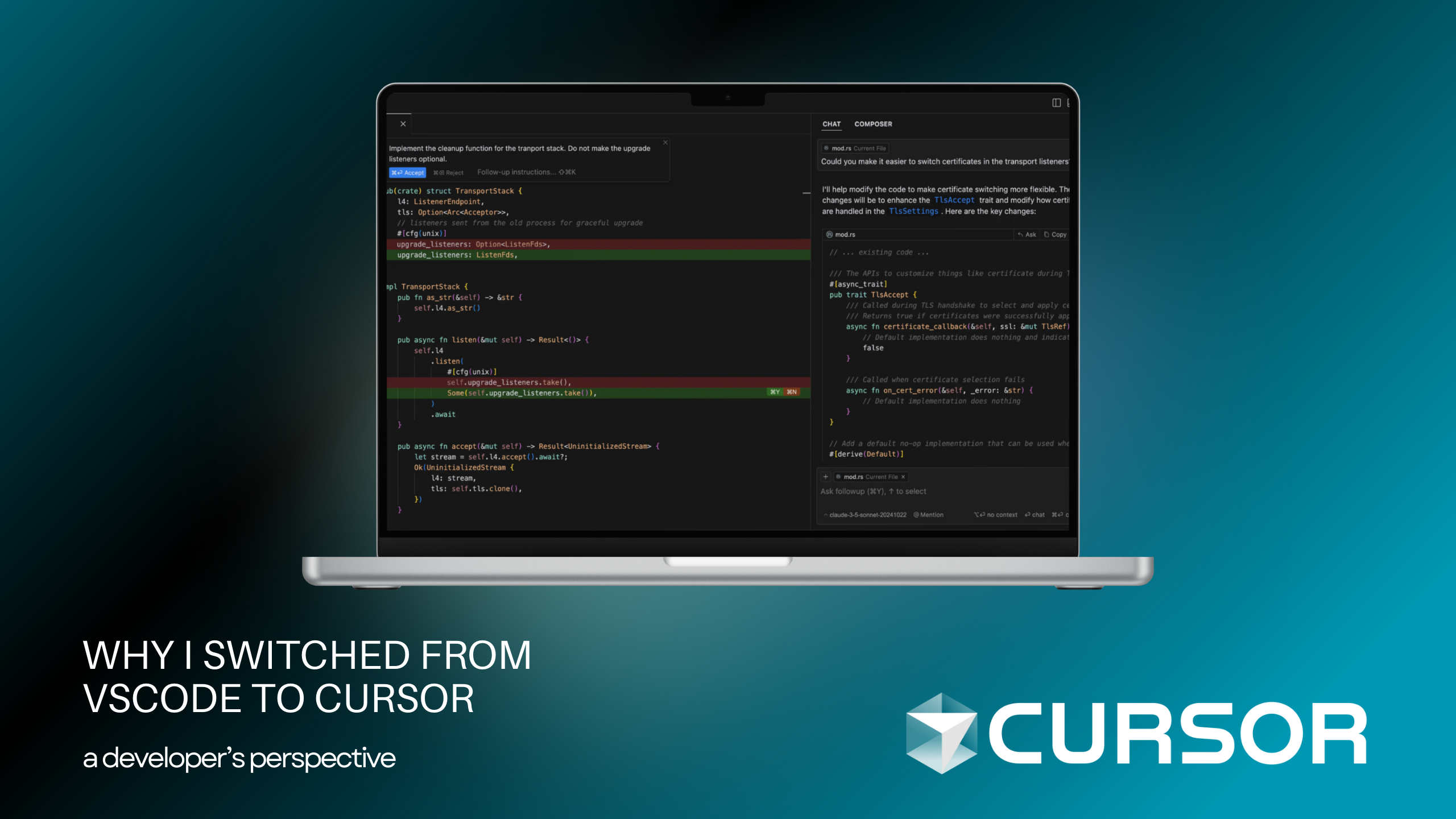Why I Switched from VSCode to Cursor: A Developer's Perspective
2 mins read

After years of loyal service, I recently decided to part ways with Visual Studio Code (VSCode). Don't get me wrong—it's a fantastic editor. But over time, its performance inconsistencies started to wear on me. Enter Cursor, an AI code editor that feels like VSCode's smarter, faster sibling. Here's why I'm not looking back.
The Breaking Point with VSCode
VSCode has been my daily driver for years. Its extensibility, ecosystem, and community support are unparalleled. But as my projects grew in complexity, so did the friction:
- Performance lag: Startup delays, slow file indexing, and occasional freezes during heavy tasks.
- Context switching: Jumping between terminals, browser tabs, and plugins disrupted my flow.
I wanted an editor that anticipates my needs, not one that requires endless configuration.
Discovering Cursor: First Impressions
Cursor markets itself as "The AI Code editor built to make you extraordinarily productive, Cursor is the best way to code with AI." Skeptical but curious, I installed it. Within minutes, I noticed differences:
1. AI Baked into Every Interaction
Ctrl+Kbecame my new best friend:- Generate code blocks from plain English prompts
- Refactor code with natural language commands
- Auto-debug errors by describing the issue
- Cursor Agent became my new super-smart coding assistant:
- Pull in context automatically
- Run terminal commands
- Do semantic code search
- Handle file operations
- The
.cursorrulesfile. It's a way to give the AI a rules for project-specific instructions. - Bug Finder is a feature that scans through all code recent changes, and looking for potential bugs.
2. Blazing-Fast Performance
- Cold start in <2 seconds (vs VSCode's 5-8s on my machine)
- Smoother navigation in large monorepos
- Minimal memory footprint even with multiple workspaces
3. VSCode Compatibility… But Better
- All my VSCode shortcuts, and keybindings worked out of the box
- Native support for
.vscodesettings and extensions (with AI-enhanced alternatives)
Game-Changing Features After 1 Week
🤖 AI That Feels Like a Pair Programmer
Cursor's AI doesn't just autocomplete—it thinks. Examples:
-
Codebase-aware edits:
Prompt: "Add error handling to thefetchUserDatafunction inapiService.ts"
Result: It located the function, analyzed existing patterns, and inserted try/catch blocks with proper logging. -
Seamless Documentation:
Highlight a React component →Ctrl+K→ "Explain why the state isn't updating here" → Accurate diagnosis of stale closure.
⚡ Performance That Keeps Up
| Task | VSCode | Cursor |
|---|---|---|
| Load 10k-line JSON | 3.2s | 1.1s |
| Find in Project | 4.5s | 1.8s |
| RAM Usage (avg) | 1.2GB | 680MB |
Quirks and Limitations
No tool is perfect. Here's where Cursor still needs work:
- Extension ecosystem: While compatible with VSCode extensions, some require tweaks.
- Offline limitations: Heavy AI features require internet (though local LLM can be setup using Ollama, and CodeGPT extension).
- Learning curve: Unlearning old VSCode+Extension habits takes time.
Should You Switch?
Try Cursor if:
- You're tired of repetitive prompt to AI Chat
- Performance bottlenecks annoy you
- You want an editor that evolves with your workflow
Stick with VSCode if:
- You rely on niche extensions
- Prefer total control over AI interactions
- Work primarily offline
Final Verdict
Cursor isn't just "VSCode with AI"—it's a re-imagining of what a code editor can be. After a week, my productivity has noticeably improved. The AI feels less like a tool and more like a collaborator, and the performance gains are impossible to ignore.
Rating: ⭐⭐⭐⭐½ (4.5/5) Where to Try: cursor.com (Free tier available)
Have you tried Cursor? Share your thoughts in the comments!